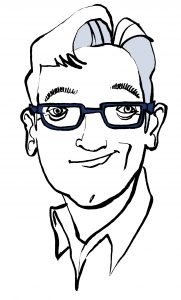I think that it is pretty incontestable that, throughout the Covid-19 crisis, our government, along with most others – goodness knows what is going on in Brazil! – have been resolutely following “the science”. We know this because they keep telling us. We also know that following “the science” is a really good thing to be doing. We know this because it is an unquestioning assumption every time a politician stands up flanked by some real scientists. We know it even when the scientists look close to mortified when “the science” apparently suggests that a good internal bleaching might be the very thing to save our lungs from the ravages of Coronavirus. We know it because it does sound better than “we are making this up as we go along” or “I used to go to measles parties when I was a child and it never did me any harm” or even “we’ve just decided this might be a good idea”.
This means that it is worth asking the question “when did it become THE science?”. When were we reduced to only one set of scientific views? When did it stop being the Sciences? When did scientific debate free itself from any scintilla of controversy?
The associated questions
There are other associated questions. If we are all following a science so clear and uncontradictable that it merits the definite article, why does it seem to be taking different countries in different directions? Apparently, Sweden is also following THE science, but it is not leading the Swedes into lockdown. It seems to have led a number of countries into different strategies. The “test, trace, isolate” appears to have been a popular result of following the science and appears to have been quite effective. Meanwhile, in Britain we seem to have been stumbling towards that, not as a means of containing the virus, but as a means of ending lockdown. For us it appears not so much a strategy for prevention of initial spread, but of preventing a second wave.
It is also interesting that the gold standard of “the science” has allowed the UK to vacillate wildly in policy. It permitted the Cheltenham Gold Cup, the visit of Atletico Madrid and a fair collection of fans, the odd rugby match and open airports before it insisted on quarantine. It flirted with herd immunity when we were only dealing with a version of the flu and that’s not really that much of a threat. One might have hoped that the beacon light of the science might have been more akin to the pillar of fire leading Moses and his people to the Promised Land with a limited number of deviations.
It would seem that there is no such thing as THE science. This is hardly surprising when we are dealing with a new virus. One would expect the science to be evolving. One would expect there to be different views between scientists from different disciplines and with different experiences, and that is exactly what we have seen. There is no such thing as THE science, and we should stop being patronised by the idea that there is. The concept is a fig leaf.
Why claim the science?
It is an interesting choice of a fig leaf for a government whose calling card was the rejection of “experts”. Notably, in education expertise existed only to be derided and rejected, unless the views of the expert in question sat comfortably with the policy that the government wished to adopt. Look across the UK and you will find the different nations adopting different gurus. One has to question whether these gurus drove the development of policy or provided a post-hoc justification for it.
It is interesting the Scotland has a panel of international educational experts, but when you look at the membership it is hard to imagine them fighting like cats in a sack over fundamental positions.
That’s what we do too often; we buttress adopted positions and evolve a jargon to justify the approach that we take.
Some questions about “evidence-based practice
A current favourite for me is the phrase “evidence-based practice” as if that provided a clear policy direction, as if all the real evidence pointed us in a particular direction in terms of pedagogy. I imagine that the advocates of learning styles and VAK thought that they were at the cutting edge of evidence-based practice. I certainly remember conferences where theory, observations and experiences were trotted out that justified a good solid burst of brain gym before we worked out how to respond to multiple and varied intelligences. Much of that evidence has been contradicted, but isn’t that the way with evidence? We are perfectly used to a court situation where there is evidence for the prosecution and for the defence. We accept the concept of balancing evidence, of engaging with it, of filtering it in the context of justice, but in educational debate, too often, we wield it as a bludgeon to end debate. We champion schools like Michaela(https://mcsbrent.co.uk/about-us/), but don’t talk about Newlands Junior College (https://www.insider.co.uk/news/jim-mccolls-newlands-junior-college-11052387) or we attempt to recreate Newlands and dismiss the achievements of Michaela. Like the politicians presenting THE science, we present THE evidence. If it is worth questioning the first concept, should we not also be questioning the second?

